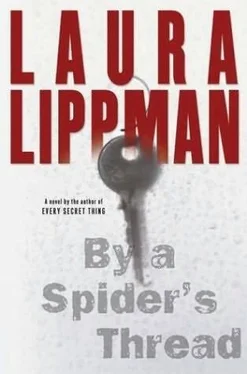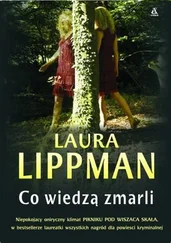"I wouldn't go out with a guy like you because you break into houses and beat up old women."
"That's what I used to do," Katzen said, wounded. "I'm a changed man. I even got a pardon."
Assuming he was telling the truth-a tricky assumption-then Katzen had come by his right to carry a firearm legitimately. But Tess wasn't convinced that Katzen knew the difference between a pardon and the mere end of parole.
"No thanks. What about Natalie Rubin?"
"Who?"
"Rubin's wife."
"The dirty Russian's daughter?"
"Never mind." Katzen's mind seemed to be on a loop, and a very short one at that. Tess left the newspaper building, convinced that Katzen was far too dumb to play dumb so effectively.
Scott Russell wasn't dumb, far from it. But the wiry forty-something man she met for coffee was simply another dead end, using Tess's time to try to pressure her into buying stocks. He was a junior executive at a discount brokerage house, working on commission, and he spoke of the market as if it were a kind of religion, a mystical force that would transform one's life if one surrendered to it completely. Tess was sure he had once spoken of aluminum siding with the same fervent certitude, and that he would probably find other gods and goods to worship throughout his working life. She bade him good-bye as quickly as possible, taking a card and promising to give serious thought to pharmaceutical stocks.
By 11:30 a.m., when Tess rang the doorbell at a converted garage on Poppleton Street, her heart was harder than the pharaoh's. The ring went unanswered at first. She checked the address for Mickey Harvey, then leaned on the bell again.
"Coming," a man's soft voice finally answered, followed by slow, careful footsteps. "Sorry, I couldn't hear you over the sander."
Mickey Harvey looked more like a living ghost man an actual man-gray eyes, gray hair, and gray complexion.
"I'm Tess Monaghan," she said. "I work for a man named Mark Rubin."
He smiled, the first man to show instant recognition at the name. "How is Mark? I haven't thought about him in years. He was very helpful to me, during my time… inside."
Inside . They all said "inside." It was more truism than euphemism, Tess decided. Serving time was something that most people could never understand, so these former inmates used a word that rendered the experience at once vague and definitive.
"You're not an engineer anymore."
He laughed, a rusty chuckle that sounded as if it didn't get out much. "What was your first clue? No, I've had this woodworking business for five years now. I do custom-builts. Money's not as good as it was when everybody was rich on paper, but I'm making ends meet."
"It's nice," Tess said, "when your avocation can become your business."
"Avocation? I'm not sure I'd call it that. Time was, I couldn't hammer a nail in straight. My ex is shocked. She always says, 'I couldn't get you to change a lightbulb when we were married, and now look at you, building armoires.' You know that old joke, right? How many Jewish boys does it take to change a lightbulb?"
"How many?" Tess responded dutifully.
Mickey Harvey made an incredulous face. "They have to be changed?"
Tess didn't have to fake her laugh, but she juiced it a little.
"So how did you end up being a Jewish carpenter?"
"I entered a vocational program while I was in a halfway house, began wood-shop courses more as occupational therapy than anything else. I don't drink anymore."
The last was offered almost as a reflexive confession. Society might be through punishing Mickey Harvey, but he was a long way from being ready to stop punishing himself.
"I'm talking to men who knew Mark through the Jessup program because his wife has disappeared, taking his children with her. Her father, who was in the program, claims to have some damaging information about her, but he won't tell us what it is. I'm just looking for any lead I can find."
He shook his head. "I wish I knew something, but I didn't even know Mark had a wife. Who was her dad?"
"Petrovich."
"Oh, yeah. I guess I knew he had a daughter, but he never told me that she was married to Mark. I was in a different cell block, though. I only saw those guys when the Tribe got together." Another twisted smile, another rusty laugh. "That's what I called it. The Tribe. And even the Tribe, small as it was, had cliques."
Tess wasn't surprised. The need to divide and subdivide was instinctive to humans, and there was no stratum of society it didn't affect. "How did the Tribe"-she used the word gingerly, not sure if she had a right to do so-"divide itself?"
"Russell and Kirsch were two peas in a pod. Katzen hung with this old dude, Yitzhak Wasserstein, who was doing a long sentence for killing a woman. Boris and Amos were buddy-buddy. Thick as thieves, as the saying goes."
"So you were the odd man out."
"Yeah, I guess I was."
"Did the men like Mark?"
"They didn't like anybody. But they didn't have any reason to dislike him. The volunteers were just another fact of life. I thought Mark was a good guy. I'm sorry his wife left him."
"I didn't say she left . I said she disappeared."
She thought the slip might be significant, but Mickey Harvey just waved the distinction away with a swipe of his hand. "But that's what women do, right? They leave. Yeah, I knew guys who cracked up their marriages, had affairs, bullied their wives. I even knew guys who convinced themselves that they wanted some other woman, only to find out that marriage is marriage is marriage. But usually it's the women who leave."
"Men leave, too, you know." Tess's heat surprised even her.
"At any rate, my wife left me. And the thing is, she left after I got out. You see, she could take being married to a guy inside. That was theoretical. Plus, she got lots of points for that. Oh, Wendy, you're so brave. Oh, Wendy, you're so good . But when I came home, I was a reality again, a guy who had killed a child and run away, destroyed every chance I had in life, and my family's along with it. That she couldn't take."
"You probably changed, too, more than either one of you could anticipate. Even change for the good can disrupt a relationship."
"Yeah, I changed. I got better. I got sober. But the big change was, I stopped making sixty thousand a year. She was remarried within a year, to some attorney. So I guess I know what my wife really loved about me."
"I'm… sorry." She thought it was what he wanted to hear.
"Me, too. I'm sorry. I'm sorry I can't help Mark Rubin out. I'm sorry I can't help myself. I'm sorry I have two kids I don't see enough. I'm sorry for everything. But do you think I can ever be sorry enough for the parents of the kid I killed?"
It was an unanswerable question, and Mickey Harvey seemed to realize this. He gave an embarrassed smile and moved the conversation to safer ground.
"Hey, tell Mark I go to temple now. Not regular, every week, but I belong to a temple, and I don't miss the High Holidays. My youngest was bar mitzvahed last month. It was a big party. His stepfather paid for it."
She started to apologize yet again. "I'm… I'm-"
"Don't. I hear it too much. I say it too much. But it doesn't change anything. And you know what? If you find Mark's wife, that won't change anything either. Trust me, it's the one thing no one can fix. Hey, want to see what I'm making?"
Tess recognized the offer as his attempt to behave normally, to ape the superficial style more suitable to an encounter between two strangers. "Sure."
He led her to the back of his workshop. A small bookshelf stood on a dropcloth. Tess didn't recognize the wood-mahogany? Cherry? Something reddish and complicated, with a swirling grain. The design was simple, but she could tell it was a simplicity born of long hours.
Читать дальше












